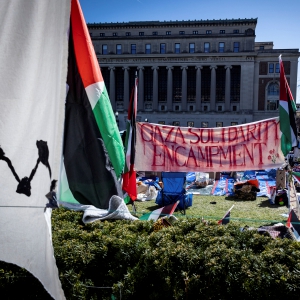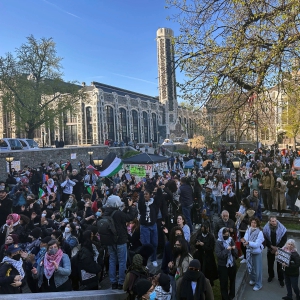Opinion: Witnessing the agony of war

Humanitarian aid is airdropped to Palestinians in Gaza City, Gaza Strip, on March 17. Mohammed Hajjar / AP
| Published: 03-29-2024 4:00 PM |
John Buttrick writes from his Vermont Folk Rocker in his Concord home, Minds Crossing. He can be reached at johndbuttrick@gmail.com
I remember the newsreels in the movie theaters about the progress of World War II. They depicted the bravery, victories, and valor of our soldiers. Even after the end of the war, we learned very little about the horrors of war. The only hint was the reluctance of some of the returning soldiers to talk about their war experiences.
In contrast, today the news media reports over and over about the devastating consequences of war in Ukraine, Gaza, and many others. Those early newsreels celebrated the sacrifices of our soldier “boys” and the righteousness of the allied forces. However, news of current wars reports despair against the brutality, the destruction of property, and the slaughter of innocents. The book “1984” got it wrong. Many people are not excited about distant wars. Instead, they fear for the degradation of the human condition.
One response to this anxiety is to turn to International Humanitarian Law, (IHL). It is a set of rules that seek to limit the side effects of armed conflict. It lays out the responsibilities of states and non-state armed groups during an armed conflict. It is based on the 1949 Fourth Geneva Convention on protecting civilians in conflict.
It requires, among other things: the rapid and unimpeded passage for humanitarian aid during armed conflicts, the freedom of movement for humanitarian workers in conflict areas, the protection of civilians (including medical and humanitarian workers), and the protection of refugees, prisoners, and the wounded and sick.
However, invoking rules for war only serves as a salve for the conscience — it’s okay to wage war if there are rules! Rules falsely remove the onus from the violence. They suggest that it is possible to wage war as an acceptable and justified way to solve disputes. Yet, rules are only blinders obscuring the hellishness of war.
War is a risky desperate act. Anything goes when survival depends upon winning. The evidence is that humanitarian rules for war are an illusion. They cannot be enforced upon nations with superior power or upon nations that win a war. Winning is justification for any actions taken to accomplish the goal. Winners write the history.
However, we are witnessing today an increasing sensitivity toward the existential horrors of war. For example, Israel’s or Russia’s goal of winning their respective wars is being overshadowed by the demand for an accounting of the human cost from death and injury, bombed out homes and infrastructure, access to food and health care, and the collapse of family units.
Article continues after...
Yesterday's Most Read Articles
 Opinion: Public school standards overhaul will impact every facet of public education in NH
Opinion: Public school standards overhaul will impact every facet of public education in NH
 With new plan for multi-language learners, Concord School District shifts support for New American students
With new plan for multi-language learners, Concord School District shifts support for New American students
 With Concord down to one movie theater, is there a future to cinema-going?
With Concord down to one movie theater, is there a future to cinema-going?
 Opinion: The Concord School Board can restore trust with residents
Opinion: The Concord School Board can restore trust with residents
 Concord man charged felony criminal mischief following vandalism outside NH GOP event
Concord man charged felony criminal mischief following vandalism outside NH GOP event
 Getaway driver in Winnipesaukee hit-and-run arrested
Getaway driver in Winnipesaukee hit-and-run arrested
As never before, the growing transparency of the horrors of war is giving us two choices. One is to accept the cycles and wages of war, along with the accompanying military industrial complex, as essential and normal.
The second option could be to acknowledge that the human cost of war is too high. Wars and rumors of wars have existed for thousands of years. Each war is perceived as the last one, but wars breed more war.
Consider the land of Canaan, a trade route through the Middle East. “As the great powers battled each other through the centuries, they necessarily had to traverse the land bridge between Africa and Asia. As the balance of power has swung between those superpowers, conquering armies would march through the countries separating them, sometimes forcing local residents to adopt the culture of the conqueror. It is a story of great powers, wars, invasions, revolts, and exiles.” The local residents were the ones trampled again and again over the centuries.
I am a person of the ‘60s, the “where have all the flowers gone?” and “what if there was a war and nobody came?” generation. Yet wars continue to be with us. What has changed is a growing awareness of the tragedies and injustices of war that could lead to enhanced insight. Only human beings have the ability to consider alternative realities.
Now may be the time to exercise that ability. Now may be the time to withdraw citizen support for the deployment of U.S. military bases in 80 countries with 171,700 troops. Now may be the time to withdraw citizen support for the production and selling of weapons to other countries, sometimes to both sides in a conflict with one another. Now may be the time to stand with the innocent ones and give aid to those caught in the crossfire.
Changes like these do not happen overnight. However, over time, speaking our discontent to neighbors and political leaders, the culture of a waring nation can change. It can make a difference to acknowledge that it is not possible even for International Humanitarian Law to sanitize war.
Imagine waging war only as a last resort and always accepting our complicity in military conflicts to solve disputes. Consider the impact of multiple wars on human beings. Then ask the question, “How do I feel about our involvement in such horrendous actions?” That feeling might just surface the existential human potential to break the cycle of wars. It might be the salvation for the next generation.


 Opinion: Campus chaos and America’s character
Opinion: Campus chaos and America’s character Opinion: Learning from landscapes
Opinion: Learning from landscapes Opinion: Summer camp registration: The only thing higher than the price is the anxiety
Opinion: Summer camp registration: The only thing higher than the price is the anxiety Opinion: ‘This being human is a guest house’
Opinion: ‘This being human is a guest house’
